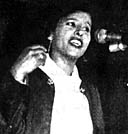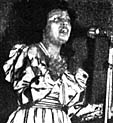
Favorite Yemeni Female Singers [Archives:1998/42/Culture]
October 19 1998


In Villages:
To express their passions, feelings and dreams, women in rural areas in Yemen used to chant. One of their songs was “Al-Dawdahyiah.” This song was later performed by Mohammed Abdu Zaidi, and was recorded for Aden radio in the mid-60s.
Another famous song sung by women working in the fields was “Erja’a Lehawlak” (come back to your land). This song was performed by the great Yemeni singer Ayoob Tarish. Personally, I arranged the music for this song when I was the maestro of the Arab Music Band in Aden in the mid-70s.
In the cities, women had better opportunities to sing. Some Yemeni women took their place in society as professional singers and they were really loved by the people.
First Female Singer in Yemen:
During the late ’30s and early ’40s, record companies proliferated in Aden. Fattoom Nasser appeared as a singer then. She moved out from Hodeida to Aden during the Imimate period, and became famous after performing a Tihami song which was released on record later.
Other Yemeni Female Singers:
1. Nabiha Azim:
She was the first woman in Yemen to sing for Aden’s radio in the late ’50s and early ’60s. She worked at first with Abu Bakr Salim Belfaqih, who composed the song “Min Nadhretak ya Zain” (I loved you at first sight) especially for her. With her distinct performance, Nabiha Azim created a new trend in Yemeni singing. Unfortunately, she stopped singing when she got married and went to Djibouti.
2. Raja’a Ba-Sudan and Sabah Monassar:
It was the idea of Ahmed Qassem, the famous Yemeni singer, to form the first group of three female singers: Raja’a Ba-Sudan, Sabah Monassar and Asmahan. During the ’60s in Aden, Raja’a Ba-Sudan performed the song “Doq Al-Qa’a” (thump the ground).
She used to sing in theaters which made her more famous and loved. She was the first woman who sang for great Yemeni musicians like Ahmed Qassem and Salim Ba-Madhaf. She participated with other singers in performing the song “People’s Revolution.” In the mid-’70s, she stopped singing and started working as a secretary in one of the ministries, where she still works.
3. Fat’hia Al-Saghirah:
She began singing in children’s programs on Aden’s radio. Being Ahmed Qassem’s wife paved the way for her to become famous quickly. Her nice voice with Qassem’s compositions created a group of distinguished songs. She joined him in many celebration events in Kuwait, Emirates and other Gulf countries. She was, in other words, the representative of the Yemeni song there. Fat’hia Al-Saghirah still sings. She lives today with her daughter in Britain.
4. Amal Ko’adol & Kafa Iraqi:
In 1980, through a TV program, “New Faces,” Amal Ko’adol appeared as a new talent. Entering a singing competition, she was the best among her classmates at Bilquis College in Aden. I joined her as a lute player that time. I doubted that she would stop singing like the others. But she surprised me with her ability to sing to the most difficult musical tunes.
One of her best works was the song “Al-Wahda Al-Yemenia” (Yemeni unity) in which she sang with Qassem. Ko’adol seems set for more fame in the future.
Kafa Iraqi appeared as a singer in 1982 through the same TV program “New Faces.” Mr. Yousif Ahmed Salim was the one who supported her at the beginning. He participated with her in a duet. Iraqi recorded 4 songs for Aden’s radio & TV. She sang for many Yemeni musicians for some years. After that she stopped singing and worked for Aden’s TV as a director and until now she is doing that job.
Conclusion
Generally speaking, women do not have any real chances to be singers in Yemen. In fact, their rights are being eroded day after day. Society, does not respect them. On the contrary, they are regarded as bad women.
On the other hand, there are arguments about Islam not allowing singing. Despite that, women find ways to sing, even if these ways do not bring them widespread fame. They sing at wedding ceremonies where large numbers of women come together. I hope that they can play a bigger artistic role, but are they willing to challenge society and religion?
Saleh Abdulbaqi,
Arts Editor, Yemen Times
——
[archive-e:42-v:1998-y:1998-d:1998-10-19-p:./1998/iss42/culture.htm]


